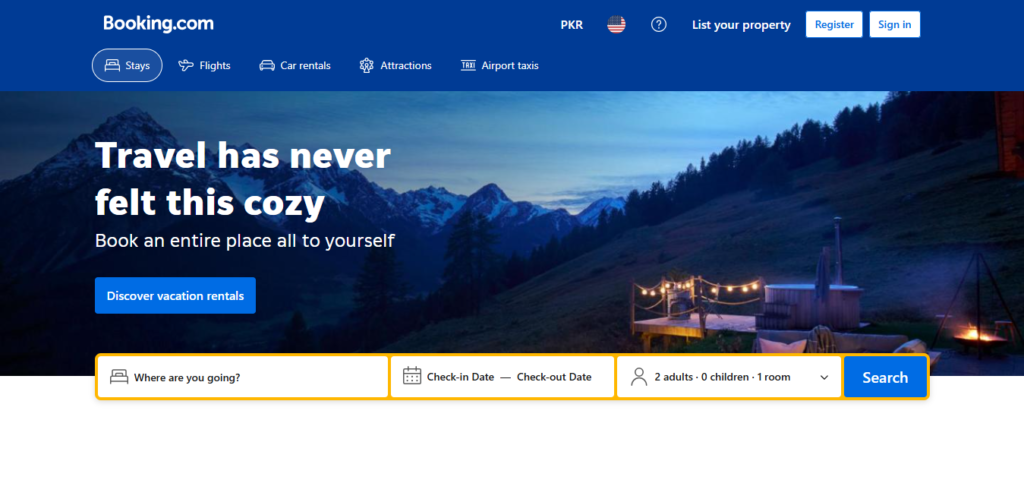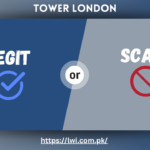Booking.com is not entirely legitimate, as it has faced numerous complaints about hidden fees, misleading listings, and subpar customer service, which have raised concerns among users.
While it is widely used for booking accommodations, its business practices and customer experience have come under scrutiny, with many users accusing the platform of operating in a way that can be deceptive or frustrating.
In this article, we will explore these concerns in detail, examine customer reviews, identify scam-like practices, and provide advice on how to safeguard yourself when using Booking.com.
Booking.com: A Brief Overview
Booking.com started as a small Dutch startup based in Amsterdam, and it has since grown into one of the world’s largest travel agencies. With more than 28 million accommodation listings, including hotels, apartments, and unique places to stay, the platform connects millions of travelers to booking options globally. The company operates in over 70 countries and offers services in 43 languages.
What Does Booking.com Offer?
- Wide Range of Accommodations: From luxury hotels to budget hostels and home rentals, Booking.com claims to have something for every type of traveler.
- Best Rate Guarantee: Booking.com promotes its “best price guarantee,” which ensures that travelers can book accommodations at the lowest possible price.
- Instant Confirmation: Reservations are instantly confirmed, which is a great feature for travelers who are on the go.
- 24/7 Customer Support: Booking.com offers round-the-clock customer service, ensuring that users can reach them at any time for assistance.
Despite these offerings, there are growing concerns about the platform’s legitimacy due to various negative experiences shared by users across multiple review platforms.

User Reviews: What Do Customers Really Think?
Trustpilot:
On Trustpilot, Booking.com currently holds a poor rating of 2.4/5 based on over 78,000 reviews. Many users have shared negative experiences, with complaints ranging from misleading bookings to poor customer service.
Despite this low rating, Booking.com has claimed its profile on Trustpilot but has failed to respond meaningfully to negative reviews. This lack of engagement raises concerns about the platform’s commitment to resolving customer issues.
ConsumerAffairs:
On ConsumerAffairs, Booking.com has an even worse rating of 1/5, with over 5,900 reviews. Customers have consistently reported issues such as booking cancellations, unresponsive customer service, and unexpected charges. This poor rating is a stark contrast to the glowing reviews on Google Play Store and Apple App Store.
Google Play Store and Apple App Store:
Booking.com holds relatively high ratings on Google Play Store (4.5/5) and the Apple App Store (4.8/5), with millions of reviews. However, many users question the authenticity of these reviews, suspecting that Booking.com has purchased fake, positive feedback to boost its reputation on these platforms.
While it’s not uncommon for large companies to employ reputation management tactics, the sheer volume of positive reviews, especially compared to reviews on more reputable platforms, raises red flags.
Reddit and Quora: Exposing the Scam
Users on Reddit and Quora have also voiced concerns about Booking.com’s practices. Many travelers have shared their negative experiences, describing how they were charged for bookings that were later canceled without proper notification, or how customer support failed to address their issues.
These platforms have become a place for users to share their stories and expose what they believe are fraudulent activities.
Allegations of Scam Practices: What’s Really Going On?
Booking.com’s Lack of Transparency in Cancellations and Refunds
One of the most frequent complaints about Booking.com revolves around its cancellation policies and refund process. Many users have reported being charged for reservations that were later deemed unavailable.
Booking.com’s refusal to refund money in a timely manner has caused frustration among customers. Some users have reported waiting for weeks before receiving their refunds, while others have been denied refunds altogether.
The company’s policy often states that cancellations must be made a certain number of days in advance to avoid penalties. However, users have shared stories of canceled bookings that resulted in unexpected fees, making it appear as though Booking.com is intentionally exploiting its customers for financial gain.
Hidden Fees and Price Increases
Several customers have also complained about hidden fees that appear after a booking has been made. These fees, which are often not clearly disclosed at the time of booking, can drastically increase the total cost of the reservation. Some travelers have reported being charged extra amounts for services that were not disclosed upfront, leading to feelings of being misled and scammed.
Furthermore, many have stated that Booking.com uses dynamic pricing—adjusting prices based on demand or availability—which can cause a price to rise dramatically even after a booking has been confirmed. This practice has left many users feeling deceived and disillusioned with the platform.
Unverified Listings: A Major Issue for Travelers
Another serious allegation against Booking.com is the presence of unverified listings on the site. Some users have claimed that they were sold accommodation options that didn’t exist, were inaccurately described, or were completely different from what was advertised.
For example, some properties listed as luxurious five-star hotels have been found to be outdated, run-down buildings with no resemblance to the pictures shown on the website.
Overcharging for Services and Non-Refundable Charges
Booking.com has faced accusations of overcharging customers for services and not being transparent about its pricing structure. For example, many customers have reported being charged for extra services that were supposed to be free or included in the original price.
Additionally, in some cases, Booking.com has refused to refund the customers for services they never used, further contributing to the perception that the platform engages in deceptive business practices.
Why Booking.com Avoids Responding to Negative Reviews
Booking.com’s failure to address negative feedback is another concerning issue. As mentioned earlier, they have claimed their Trustpilot profile, yet they have not responded to or engaged with customers who have left negative reviews.
This silence is a stark contrast to their aggressive marketing campaigns and raises concerns about the company’s accountability. Many users believe that Booking.com deliberately ignores these complaints to avoid drawing attention to their flaws and scam practices.

The Importance of Customer Support: A Lack of Accountability
A common theme among negative reviews is Booking.com’s lack of accountability and its inability to provide effective customer support. Many customers report long wait times and poor assistance when dealing with issues such as booking discrepancies, cancellations, or refund delays. The absence of a direct contact number or live chat service leaves users feeling abandoned and ignored.
The lack of response to complaints and a general lack of effective customer support creates an image of a company that is only interested in collecting payments and not in providing genuine service to its users.
How to Protect Yourself When Using Booking.com
Despite the growing number of complaints and scam allegations, many people still use Booking.com for their travel bookings. If you decide to use the platform, here are a few precautions to take:
- Double-Check the Booking Details: Always cross-check the hotel or accommodation details before confirming your reservation. Look for the most reliable sources of information, such as user reviews on trustworthy platforms like TripAdvisor.
- Avoid Non-Refundable Options: Whenever possible, opt for flexible or refundable booking options to avoid being stuck with a non-refundable charge if the booking doesn’t go as planned.
- Contact the Property Directly: If you are unsure about a reservation or a listing, it’s a good idea to contact the property directly before finalizing the booking.
- Be Cautious of Hidden Fees: Always read the fine print and make sure you understand the total cost of the booking before making a payment.
Conclusion: Is Booking.com Legit?
Booking.com has undeniably become a major player in the online travel booking industry. However, its reputation has been tainted by numerous customer complaints, with many users accusing the platform of scam-like practices, including hidden fees, unresponsive customer service, and misleading listings.
While the company continues to boast high ratings on platforms like Google Play and the Apple App Store, the lack of engagement with negative reviews on more reputable sites like Trustpilot and ConsumerAffairs is troubling. Travelers should approach Booking.com with caution and remain vigilant about potential issues such as hidden charges, unverified listings, and delayed refunds.
In conclusion, Booking.com may not be an outright scam, but it certainly has issues that could leave customers feeling deceived and dissatisfied. It is essential to read reviews, check for transparency, and carefully assess your booking options to avoid falling victim to potentially misleading practices.
Check Similar Platform Review: Is Travel Business Class Legit or Scam?
Frequently asked Questions
Is Booking.com Safe to Use?
Booking.com is widely used but has faced complaints about hidden fees, misleading listings, and poor customer service. While not a scam, users should proceed with caution and verify booking details before confirming.
Are the Reviews on Booking.com Trustworthy?
Booking.com has mixed reviews. Positive feedback may be skewed by fake reviews, while negative feedback often highlights hidden fees, cancellations, and unresponsive customer service. Checking external review sites can offer more transparency.
What Hidden Fees Should I Expect?
Users often report hidden fees on Booking.com, such as extra charges for services not mentioned upfront. Always read the fine print and check for any additional costs before finalizing your booking.
How Do I Contact Customer Service?
Booking.com’s customer service is often criticized for slow response times and unresolved issues. If needed, try reaching out through multiple communication channels and keep records of your interactions.
Why Are There Negative Reviews?
Booking.com faces criticism for hidden fees, poor customer service, and misleading listings. These issues create dissatisfaction among customers, contributing to the platform’s negative reviews.
How Reliable Are Cancellations and Refunds?
Booking.com has been criticized for its handling of cancellations and refunds. Some users report delays or refusals when requesting refunds, so it’s essential to understand cancellation policies clearly.
Are Listings Verified?
Some users report discrepancies between listed properties and actual accommodations, with some properties not matching descriptions or photos. Always verify listings directly with the property before booking.
Can I Trust the Ratings?
Ratings on the Google Play Store and Apple App Store may not reflect the full reality of customer experiences, with some suspiciously positive reviews potentially misleading users. Cross-check reviews on trusted platforms.
Are There Scam Practices on Booking.com?
Booking.com has faced accusations of scam-like practices, including overcharging, misleading listings, and poor customer support. It’s important to verify all booking details to avoid these pitfalls.
How Can I Protect Myself on Booking.com?
To avoid issues, always double-check booking details, verify properties with direct contact, and opt for refundable bookings when possible. Stay cautious of hidden fees and read reviews thoroughly before confirming any reservation.







